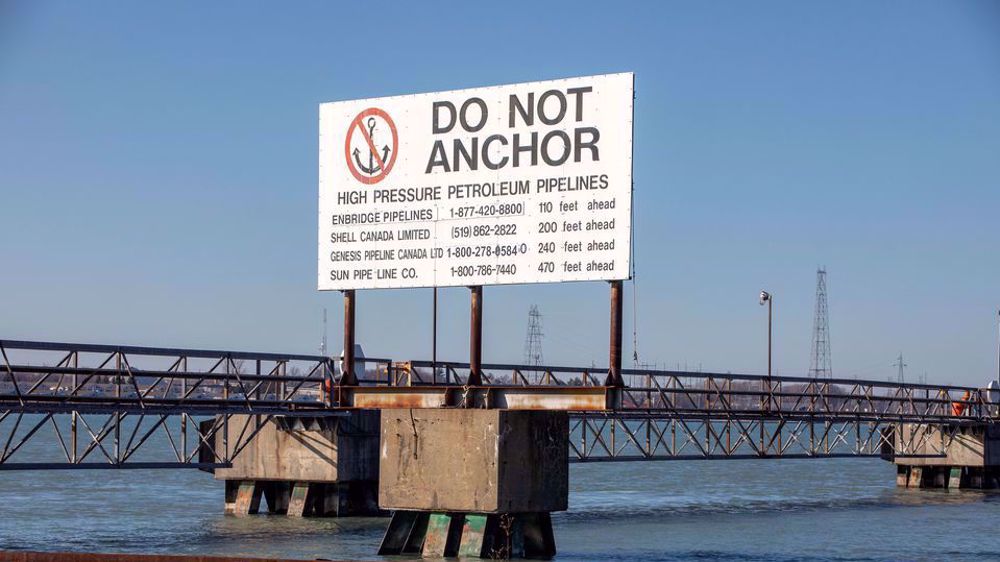Frustrated Canada presses White House to keep Great Lakes oil pipeline open
An ongoing dispute over a cross-border oil pipeline between Canada and the United States is escalating as Ottawa is pushing on several diplomatic fronts against the US state of Michigan's efforts to close it.
Michigan officials, citing environmental concerns, have called for the closure of Line 5 pipeline, which carries over half a million barrels of oil and natural gas liquids each day from Superior, Wis., to Sarnia, Ontario.
The 645-mile pipeline, which is part of Calgary-based Enbridge Inc.’s mainline system, feeds refineries in Michigan, Ohio, Pennsylvania, Ontario and Quebec.
The imbroglio is indicative of the disruptions caused by a global shift away from fossil fuels. Both governments are attempting to speed up the energy transition, however, their oil industries are interdependent, so a policy shift in one can impact energy supply, and the political balance, in the other.
The United States imports more crude from Canada than any other country, at about 3.7 million barrels per day - nearly 80% of Canada's crude output.

Four sources familiar with the government's thinking told Reuters that Canada’s strategy is to repeatedly bring up the issue of Enbridge’s Line 5 with different US counterparts - including US President Joe Biden – in order to get them to prevent Michigan's Democratic Governor Gretchen Whitmer from closing the pipeline.
Last November, Michigan ordered Line 5 to shut by May 13 citing a risk to the environment over a possible leak in the four-mile (6-km) stretch of the 540,000-bpd line passing under the Straits of Mackinac in the Great Lakes.
Enbridge has, however, refused to shut the pipeline, asserting the Whitmer's order needs to be supported by a judge. The case is currently being heard in US federal court and the two parties started mediation on April 16.
Canadian officials argue closing the pipeline would choke off over half of the supply used to make gasoline, jet fuel and home-heating oil for the most populous parts of the country.
Line 5 has been in operation for almost 70 years, but officials in Michigan have expressed concerns over its advanced age.
The line has never leaked into the straits but there have been at least eight other spills since 1980, US Pipeline and Hazardous Materials Safety Administration data show.
The conflict has become the second such dispute since Biden became US president in January, impeding the governments' efforts to work together to lower carbon emissions.
The White House has, so far, been indifferent to Canadian entreaties, prompting Ottawa to contemplate more drastic options, including a threat to invoke an obscure bilateral treaty to keep Line 5 operating or intervene in the legal dispute currently playing out in US courts.
The sources said that Canadian government officials are frustrated by the amount of time they are spending on the matter.
Ottawa has discussed the pipeline's fate in several bilateral meetings, including 23 virtual meetings between lawmakers and US members of Congress, according to a spokesman for Canada's Natural Resources Minister Seamus O'Regan.
"Clearly Line 5 is an important issue for the government of Canada ... at the same time we need to be advancing on a cooperative basis the work we're doing on climate action," Canada Environment Minister Jonathan Wilkinson told Reuters earlier this month.
Wilkinson brought up the issue during a meeting with US climate envoy John Kerry on Feb. 24. Canadian Prime Minister Justin Trudeau also raised the matter with Biden when the two met in February to discuss effort to make global warming a joint priority.

Trudeau's administration is considering whether to participate in the legal challenge by filing an amicus, or "friend of the court" brief, which would clearly lay out their reasons for supporting Enbridge, said a source directly familiar with the matter.
Ottawa is also mulling over whether to invoke the never-before-used 1977 Transit Pipelines Treaty, designed to prevent US or Canadian public officials from impeding the flow of oil in transit.
"The federal government continues to have a role to play, and we appreciate what they've done to date," Enbridge’s spokesman Ryan Duffy said.
This comes just three months after Biden angered the Canadian oil and gas industry by revoking the permit needed to finish the controversial Keystone XL pipeline, a years-long project that would have carried oil sands crude from Alberta, Canada, to the American Gulf Coast.
Biden’s action on his first day in office marked the second time a Democratic administration has scuttled the $8 billion project in less than a decade.
Trudeau's government reluctantly accepted that decision, although it resulted in losses of thousands of construction jobs and further soured Ottawa's relationship with the key energy-producing province of Alberta.
VIDEO | Yemenis praise the military for its successful operations against Israel
VIDEO | Israel continues to bomb Gaza homes
VIDEO | An insider's view of the country: Meybod City in Yazd
‘All wars have rules. All of those rules have been broken’ by Israel
VIDEO | Report flags India’s violation of rights of Rohingya detainees
Turkey's foreign minister meets Syria's de facto leader in Damascus
VIDEO | US Syria plots
'Next to impossible' to rescue patients from Gaza's Kamal Adwan Hospital: Director










 This makes it easy to access the Press TV website
This makes it easy to access the Press TV website